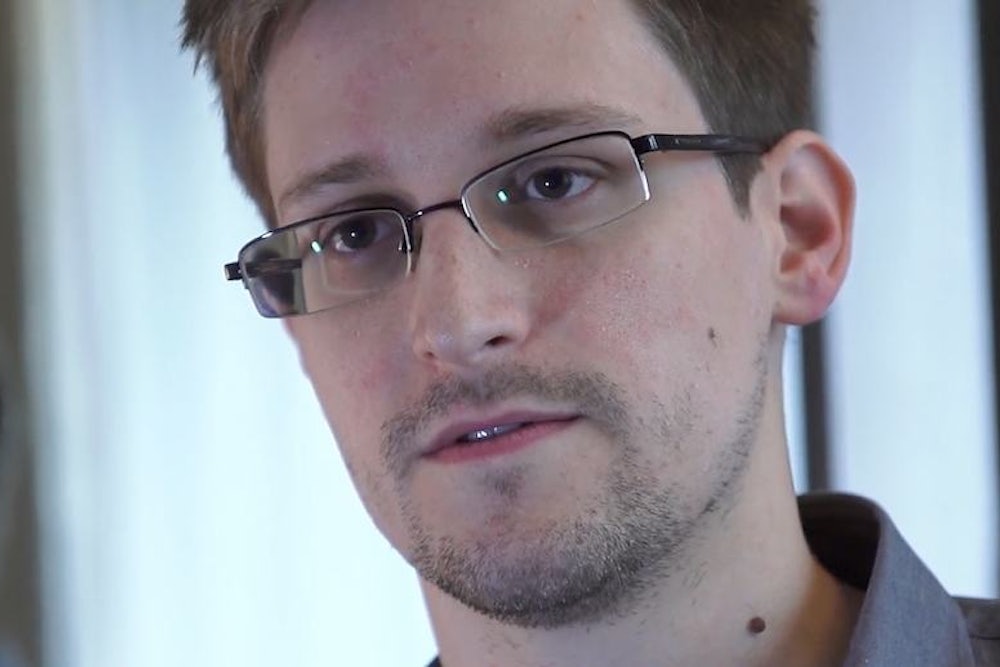Since the 29-year-old intelligence contractor Edward Snowden outed himself as the source of the NSA leaks on Sunday, reporters and pundits—heck, even Snowden himself—have compared him with Bradley Manning, the Army private on trial for passing classified material about the Iraq and Afghanistan wars to Wikileaks. There’s obviously something to the comparison—both men were apparently dedicated enough to the cause of transparency to risk their lives for it. But, after reading the early biographical reporting about Snowden, I can’t help recalling another transparency activist in the news recently: Aaron Swartz, who committed suicide in January while awaiting trial for downloading millions of pages from JSTOR, the online database of academic articles.
Both Snowden and Swartz (and, for that matter Manning) were precociously talented computer programmers who were frustrated in classroom settings—neither completed high school or college—but easily assimilated knowledge on their own. Both had strong moral and idealistic streaks, along with (apparently) well-worked out, libertarian-ish, ideas about the proper relationship of government to its citizens. Both had high hopes for Barack Obama, but became disillusioned with his administration relatively quickly.
And yet both come off as basically liberal in their outlook, as opposed to anarchist or some other form of radical. Snowden told The Guardian there was a key difference between himself and Manning: "There are all sorts of documents that would have made a big impact that I didn't turn over, because harming people isn't my goal. Transparency is." (Manning observed no such restraints.) Swartz, according to several friends I interviewed for this profile, likewise believed that Wikileaks went too far in releasing information that could do more harm than good. He worried that the group had become an exercise in showmanship and preening.
Now, clearly, there are key differences between Snowden and Swartz. Even though Swartz was facing the prospect of decades in prison, the act that got him in trouble couldn’t have been more than a minor offense under any rational legal code. (JSTOR articles are available to anyone with access to a university or research library; JSTOR itself declined to pursue the case.) By contrast, it’s obvious that Snowden, whether you agree or disagree with his decision to distribute classified material, has undertaken something of enormous legal consequence.
But whatever their differences, I think Swartz sheds light on the key mystery in Snowden’s psycho-profile. If, like Swartz, Snowden really was a liberal rather than a radical, how did he end up driven to such extremes?
In both cases, I think the answer comes down to each man’s relationship with technology. Swartz was someone who, from a very young age, was bowled over by the amount of good the Internet could do. As he got older, he became increasingly aware of how this same potential could be co-opted by malign forces, like corporations or governments. As he wrote in the “Guerilla Open Access Manifesto,” a document he released a few years before the JSTOR incident:
Information is power. But like all power, there are those who want to keep it for themselves. The world's entire scientific and cultural heritage, published over centuries in books and journals, is increasingly being digitized and locked up by a handful of private corporations.
Over time, I think Swartz came to fear that the technology could be co-opted far more easily than he’d realized—that the wall protecting the good, noble uses of the Internet and from the greedy or nefarious uses was pretty fragile. If the small handful of people who had the power to police this wall—people like him, who were both extremely able technically but also politically aware enough to appreciate the stakes for society—didn’t take it upon themselves to do it, then the situation was pretty much hopeless. Instead of being a revolutionary tool for distributing knowledge, the Internet would become an exclusive club.
Snowden’s mindset seems similar to me. He told The Guardian that, as a teenager, he considered the Internet "the most important invention in all of human history" because it connected him to “people with all sorts of views that I would never have encountered on my own.” But, as an adult, he increasingly worried that surveillance was destroying the Web. The same invention he believed could liberate mankind was becoming a tool of oppression.
"I don't see myself as a hero," Snowden said, "because what I'm doing is self-interested: I don't want to live in a world where there's no privacy and therefore no room for intellectual exploration and creativity." With a few minor tweaks, Aaron Swartz could have said the same thing.
Noam Scheiber is a senior editor at The New Republic. Follow him @noamscheiber.
